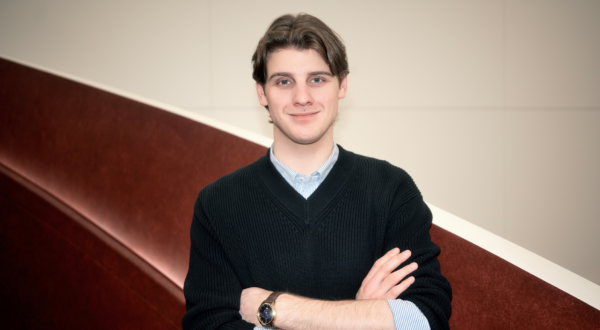Student Snapshot: Viktoria Luise Katharina Schaeff
Viktoria Luise Katharina Schaeff has been studying medicine in Riga for six years. Last year her life changed suddenly after she and fellow student Kieu Anh Thi Nguyen developed an idea for an innovative device that could be used to detect strokes earlier. Their team Smart Umbrella came second in the EIT Health Innovation Day competition and has attracted international investors.
Over the past year you have been pitching your idea to various juries – how would you pitch yourself if you had to?
I’d say I’m a very open minded and energetic medical student from Germany who enjoys developing new things.
I love to debate and to work in a team, so all my projects are collaborations.
Also, I can be pretty annoying – I always have an opinion and I’m very vocal.
How and when did you first learn about RSU?
I have to take a few steps back in time to answer this. When I was 13, I moved to the UK to enrol in a British boarding school. When I graduated I returned to Berlin only to realise that I had no clue as to what my professional calling would be! I had never considered medicine. In my mind it was a field for super-smart people from families with generations of doctors. I had thought about science as an option, about genetics and embryonic research, but never medicine. I took a year off to give myself time with this big decision and tried out different professional environments, including a hospital. It was at the hospital that I realised that medicine was an option for me, but not in Germany as I had a degree from the UK. Since I had not studied the German curriculum I would not be able to compete with local graduates to get into one of the German medical schools.
I started to look for international options and met a friend who had enrolled at RSU in 2009. She told me about the university, but unfortunately only a day before the application deadline, so I did not manage to apply properly and got rejected. Next time I did better and have been a part of the university since 2014! This is something I have not regretted a single day since.
For someone your age you have moved around quite a bit!
Indeed. It’s hard for me to say where my home is. I have so many bases, as I call them. It has made me into who I am and I have learned to approach new people easily. The world today has become more international - people move around a lot both professionally and for personal reasons. I’m very happy I was thrown into the deep end in my teenage years and learned to adapt very quickly.
Did you manage to adapt to life in Riga quickly?
I love Riga! When I first came here I already found it charming, but over the past years the changes have been tremendous – it’s become more liveable and more comfortable. Gyms, for example. They used to be either very expensive or inconveniently located, but these days there is plenty of choice and gyms have become more affordable. In many ways Riga has evolved a lot to make life easier. The only annoying thing in the city are the bridges that act like bottlenecks. There have not only been practical changes, but the mindset has changed too.
Riga has become a lot more international. When I had just moved to Riga the inhabitants were a little grumpier, but now even the minibus drivers reply with a ‘Čau!’ when I greet them.
What are your future plans?
When I was little I wanted to become a scientist, because I had met an amazing scientist and I wanted to become just like her. Then in Riga I decided to focus on general surgery, but later developed a deeper interest in paediatric surgery. When I started working in a hospital here I saw that in order to implement any changes in medical institutions you need to have a good understanding of economics and not just a medical degree. I enrolled in an on-line economics programme at a university in Germany and am currently in my 3rd semester. My idea was to be a surgeon who also works in administration. Now, however, with biotechnologies becoming more popular I have to again reconsider my focus. If I were to do a PhD it might be in clinical research.
It all boils down to the people we meet on our way that inspire us to go in one direction or another. I’ve been blessed in this respect, because I keep meeting inspiring people who impact my life for the better.
Related news
 Learning never stops: IADS European Associate Regional Representative and RSU double degree student Georgs Alberts PimanovsStudent Snapshot
Learning never stops: IADS European Associate Regional Representative and RSU double degree student Georgs Alberts PimanovsStudent Snapshot/Student_Snapshot/Viktoria_Paris_EIT_Health.jpg)



